#llmguide
Explore tagged Tumblr posts
Text
My favorite serene spots in NYC
Sometimes you just need a place to find a little bit of peace in this crazy city - to read, have a coffee, people watch, or even just scroll on your phone... With that in mind, and as my time is wrapping up in this amazing place, here are my favorite places in the city to hide out:
1. Elizabeth St Garden
This is a quirky 1-acre community sculpture garden in the Nolita (which stands for North of Little Italy) neighborhood of Manhattan, located on Elizabeth Street between Prince and Spring Streets.
Unfortunately, it is set to be redeveloped into a senior’s village - but there is a lawsuit on foot to stop this. Get there soon, and fingers crossed the suit succeeds because this place is a true gem.
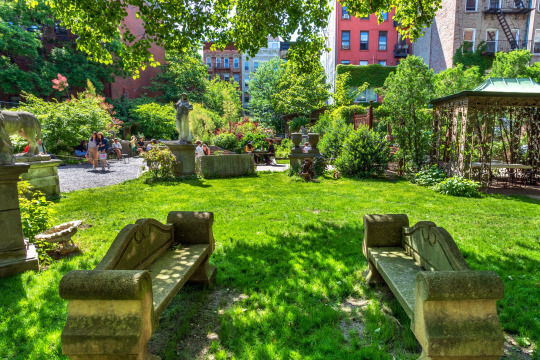
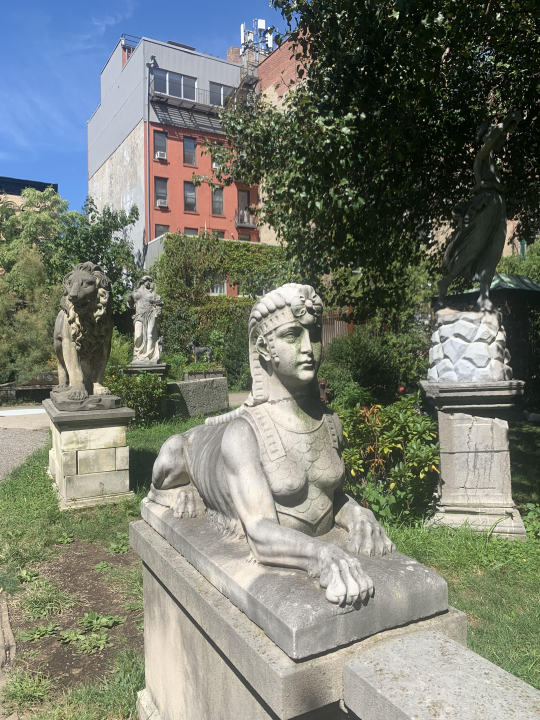

2. La Lanterna Caffe, Greenwich Village
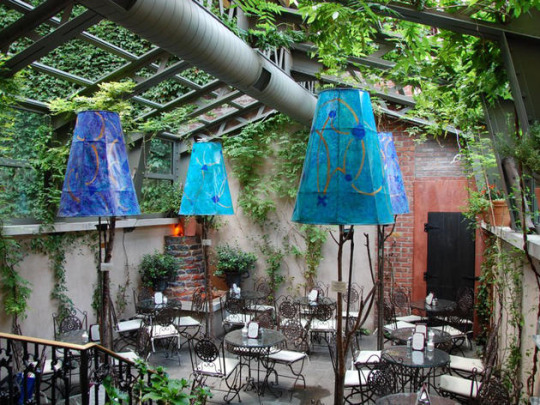
Amazing gem of a restaurant/café right across the road from NYU Law School. It’s very non-descript from the front, but opens up to this gorgeous back patio. The perfect spot for an aperol spritz, coffee, or pasta!
3. Conservatory Garden, Central Park

And even though it’s hardly groundbreaking - just Central Park in general through the seasons!
I saw the fall leaves in November 🍁
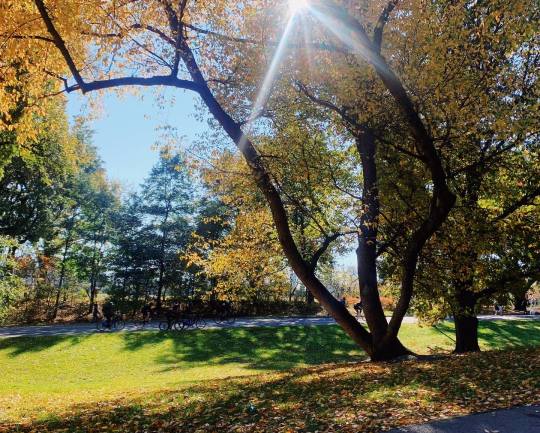
... the cherry blossoms in April 🌸
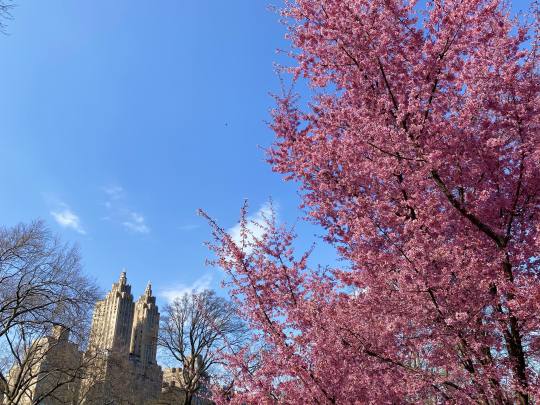

...and the lush summer greenery
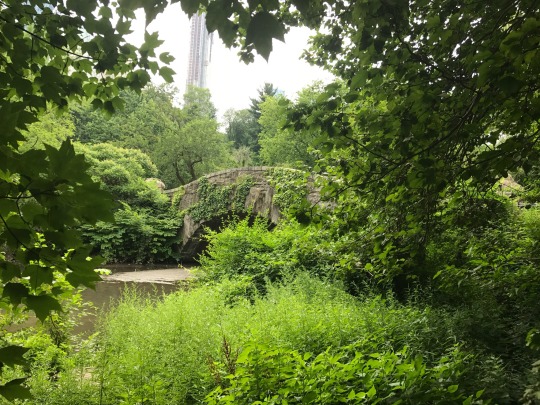
4. Brooklyn Bridge Park
You can walk over the Brooklyn Bridge (like I did in the picture below last August) or get the subway to Dumbo or Brooklyn Heights. There’re plenty of basketball courts in that blue structure over the water, that stellar view of the skyline, and lots of grass to kick back and read.

5. Brooklyn Heights Promenade
Now this is one of my favorite places in the city - especially since I moved to Brooklyn Heights in March and can sit and take in this skyline view on the benches with lunch or coffee! As you can see, it’s located just above Brooklyn Bridge Park, and there are cute dogs and babies on walks all down the promenade. This is the perfect place to relax in the sun, or take a romantic sunset stroll before dinner in Dumbo.
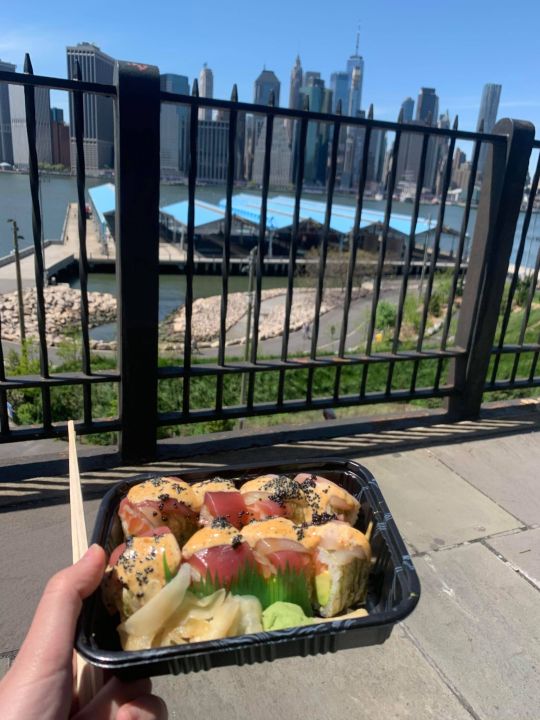
This was last night at around 7pm 🙌

Spring tulips along the promenade in April:

6. West Side Highway/Hudson River Park
When I lived in Soho near NYU, this was my go-to running/exercise spot. There are grassy piers and boardwalks, these cool wooden swings, wooden benches overlooking New Jersey, tennis courts, summery bars and restaurants, and even mini-golf!

Hard to complain about running in fall with this view:
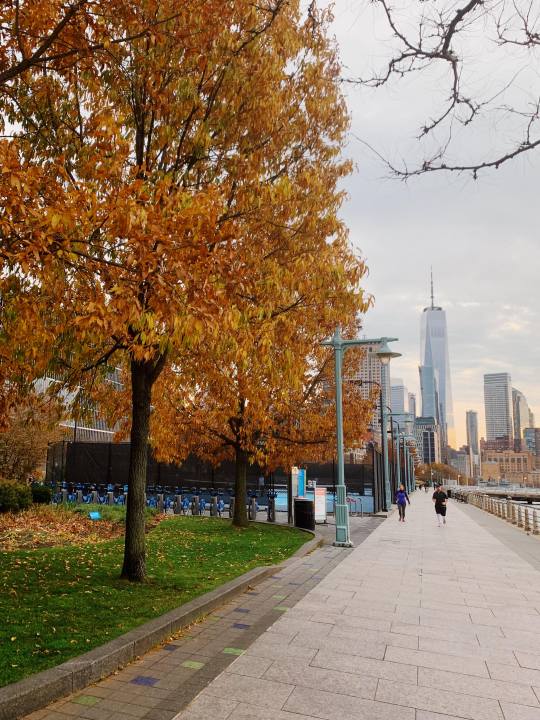
...or even in December with that biting winter cold when I got to see this sunset!

7. Wandering around Cobble Hill and Carroll Gardens, Brooklyn
This is a little bit off the beaten path, but you could make a day of heading to Brooklyn Heights Promenade/Brooklyn Bridge Park and then wandering around these nearby neighborhoods.
There are plenty of good cafes and restaurants nearby, and the well-kept brownstones and incredible care put into gardening just puts me in a good mood!

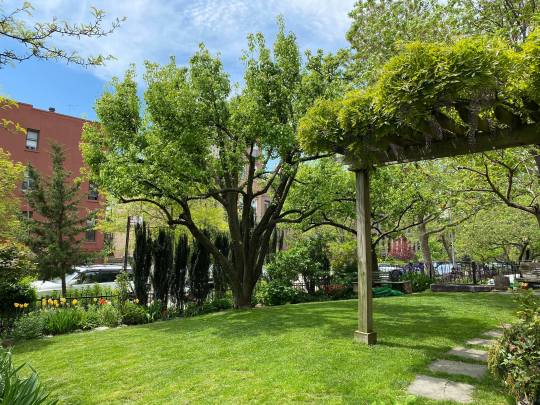
8. Vanderbilt Hall Courtyard, NYU
Last but certainly not least is NYU Law’s very own courtyard at Vanderbilt Hall. It’s pretty all year round, but especially in Spring when the magnolias, cherry blossoms and daffodils are out.

It’s a great spot to sit with a coffee and start all those readings you’re behind on, or to eat lunch with some of your LLM friends.
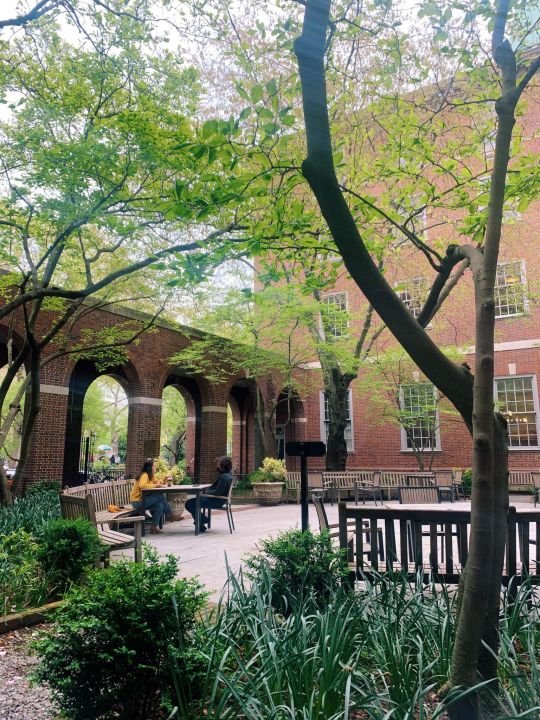
Here are some other places I’m hoping to get to in my last few weeks here:
Pier 35, Lower East Side
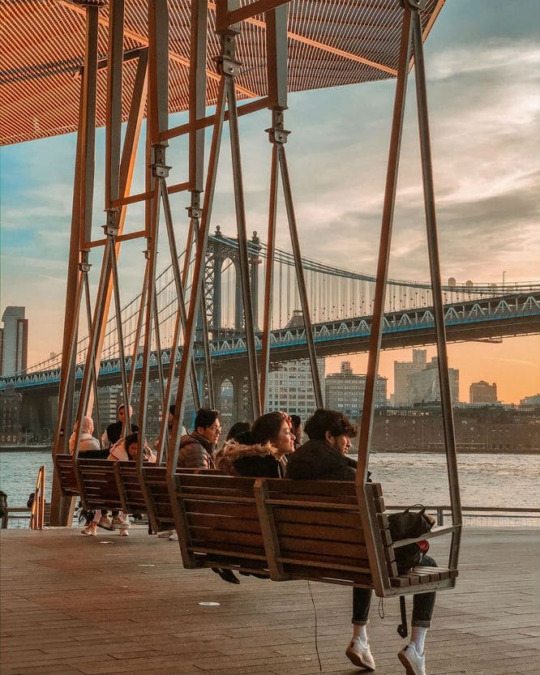
Fort Tryon, Met Cloisters
Up past the Bronx


Prospect Park, Brooklyn
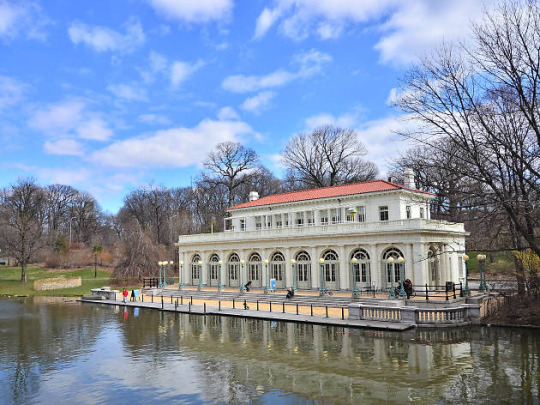

Enjoy! I almost wish I could live this year and discovering these places all over again 🙌
#nyc#newyork#nyu#lawschool#nycparks#gardens#elizabethstreetgarden#centralpark#brooklynheights#brooklynbridgepark#carrollgardens#cobble hill#brooklyn#llmguide
7 notes
·
View notes
Text
Revision tips: law exams

Preparing for examinations is always difficult. During my final year of undergraduate study, I undertook 3 exams, two of which accounted for my final degree classification. For my LLM, I undertook five exams. Over the years, I have become well accustomed to exam stress and have learnt effective methods of exam revision. I have outlined below my tips of exam success.
Timetabling
In school, we were always reminded that timetabling one’s revision is the key to success. Whilst precise timetables (e.g. factoring in all breaks) may work for some, for me, I found that allocating each day of my week to tackling a particular module/topic of study worked best.
Whilst some argue that it is most effective to cover several topics of revision a day, I have never found this approach very useful. At most, I would tackle two topics per day (one covered from the morning-afternoon, and the other from the afternoon-evening).
Acronyms
If you are studying law, acronyms should be your best friend. They work best when dealing with legal problem questions.
EXAMPLE: say you are studying Family law and have been given a problem question describing a marriage, and then have been asked to identify whether the marriage is valid, a non marriage, void or voidable.
This is how I approached the above question using acronyms: First, I identify my structure, this might look something like:
Introduction: define marriage (Hyde v Hyde and Bellinger v Bellinger), differentiate between non marriage, void and voidable marriages
Non marriage: No statutory basis- origins in R v Bham, Hudson v Leigh- Bodey J test, has there been formality non compliance? (See Al Gamal), is it a forced marriage? (B v I/Re P), did parties intend the marriage ceremony?( Galloway v Goldstein)
I then go on to condense the above information to the following letters: I (for Introduction), N (for Non marriage)
Of course, the pattern continues as I address (in this case) the latter paragraphs of my essay, which inevitably include a discussion of void marriages, voidable marriages, voidable bars, divorce, and divorce bars. In sum, my basic acronym could look something like:
I/N/V/V/VB/D/DB: Introduction Non marriage Void marriage Voidable marriages Voidable bars Divorce Divorce Bars
Remembering a bunch of letters in this way might seem daunting- but the key is to make a sentence out of the letters- preferably something related to the topic studied. In this instance, I would make the letters into a sentence pertaining to marriage/divorce.
Flashcards
Flashcards are another great way to revise- especially if you are on the go. They are particularly useful for law, because you can put the case name on one side, and the legal rule/principle established on the back.
Mind maps
Mind maps are one of the most effective methods of revision. You can condense a whole topic into one mind-map, and/or, you can organise them by sub topics if you want your mind maps to be more detailed.
What I found most effective was incorporating my acronyms into my mind maps. This makes memorisation a lot easier. Moreover, if you place your mind maps in your bedroom, you can regularly look at your acronym and try to recall what the letter stands for, as well as additional relevant information.
16 notes
·
View notes
Text
Coursework structure
During the first term students are expected to take 4 courses, each comprising half a unit. Some modules consist of lectures and seminars, others are seminar-based. Although the interactive nature of the latter means that most of the time it’s the students talking and expressing their views on a proposed topic, quite a large part of a seminar is actually a mini-lecture by the professor which is usually done at the beginning. This is a very convenient way to recap all the main ideas and concepts that you studied while doing the required reading.

The reading lists for each course are uploaded on Moodle, an online learning platform used at LSE. On a course’s page you can also find various resources for studying such as audio and video files, lecture slides, links to video recordings of lectures as well as links to scholarly works recommended for reading. To give you an idea of what it looks like, I attach to this post a screenshot of the Moodle page (intro part) for the course I took this semester - The Law of Corporate Finance. Although it was quite hard at times due to the subject’s complex nature, I enjoyed it immensely.

The semester is divided into weeks and each week you examine a different topic in your course. There are 11 weeks, with Week 6 being a reading week, that is, you don’t have any lectures or seminars and are supposed to be catching up on all the studying you didn't do or write a formative assignment. But in reality, a lot of people prefer to spend the reading week traveling. I personally went to Scotland and although I loved it there, I probably should’ve stayed and studied in the library the whole week because the workload was very heavy and demanding.
Throughout the term, you can complete a formative assessment which is basically an essay of 1,200-1,500 words. It’s in no way compulsory, but highly recommended because by getting your professor’s feedback you can dramatically improve your writing skills in time for the exams in summer. Your essay is marked but it’s not counted towards your degree, so it just gives you an idea of what kind of grade you can potentially get at the final exam. Some of the formatives are due in the reading week, but it really depends on the module and its instructor. For some of the courses you can choose one of the three options to submit a formative essay throughout the term. I think it’s designed for large-sized courses where it’s rather difficult for the lecturer to mark the assignments in one sitting and give meaningful feedback to each student.

What I absolutely love about my program is that the law department at LSE organises many events as part of LLM Specialist Seminar Series in Financial, Corporate and Commercial Law. As a student who chose the corporate law specialism, I was very happy to attend talks by leading scholars (both from UK and US) on topical issues of corporate governance as well as other related subjects. Also, we had a lecture delivered by one of LSE professors on finance which was very useful for me personally because I had very basic knowledge of finance concepts underlying the law and it really helped me with my corporate finance law module.
There are two types of summative assessments: either an exam or an essay. Most of the modules are exam-based, sometimes it can even be a take-home exam although it’s quite rare. As for the essay, you’ll need to write about 8,000 words on a certain topic approved by your lecturer. I personally have 5 modules assessed by closed book written exams, one essay-based module and one with a take-home exam. All of it will take place in May-June, which I find rather appealing because there are no exams in winter, hence there will be much more time for preparation.
4 notes
·
View notes
Text
The Beginning of the End
I write this from the beautiful NYU Law Vanderbilt Hall courtyard, in my second last week on this amazing campus.
I start my exams in 4 days (!!!) and I finished classes last week. It’s hard to believe!
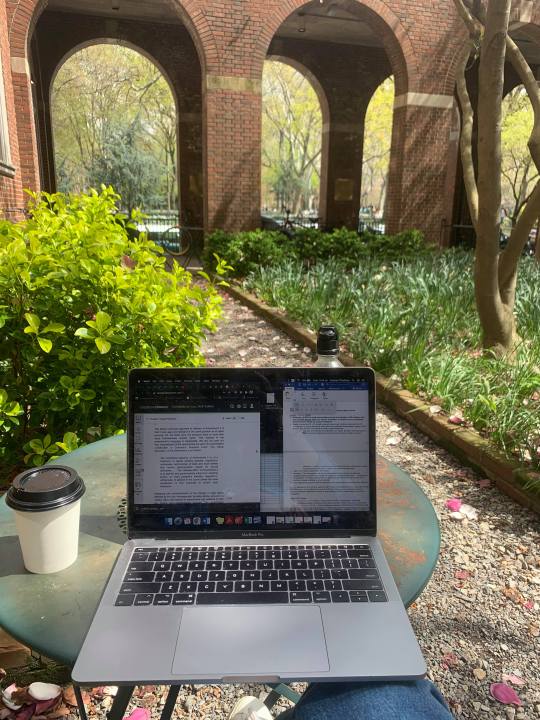
A lot has happened since I last posted. I finished my classes and my externship, got vaccinated, made many more LLM friends who started in the spring and JD friends, and I was interviewing at a few firms in the US. I’m very happy to report that I got an associate role at a firm last week! More on that in my next post, because I know many of you are probably looking for positions in the US after your LLM.
I went to my first baseball game - Yankees vs Orioles at Yankee Studium, and I had a lot of lunches and coffees in the sun at Washington Square Park with LLM and JD friends.
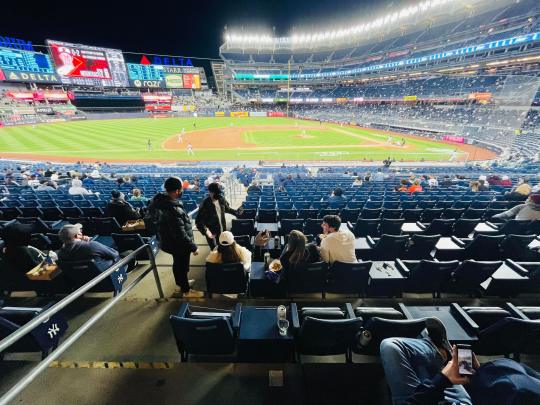
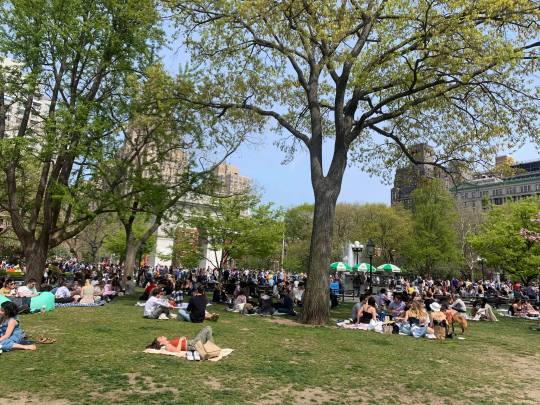
I took about 1 million photos of tulips and other flowers around the city...

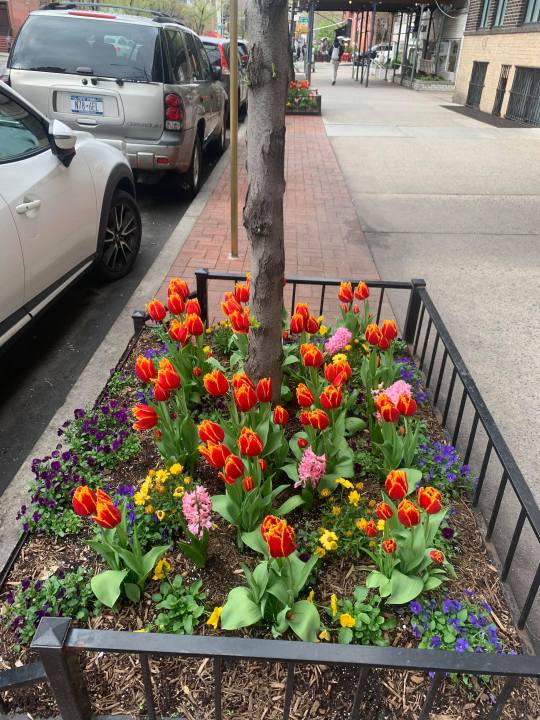
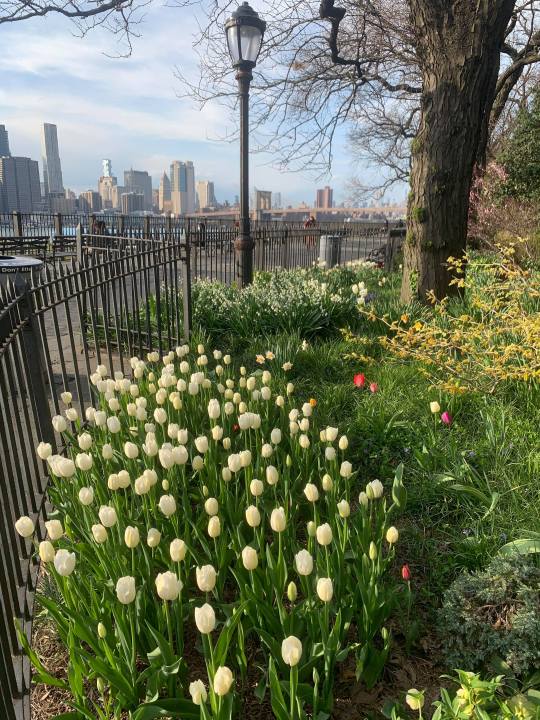
And I was also able to meet with a few of my professors for coffee and drinks (yay for the US’s roll-out of vaccinations!). This might seem trivial, but it’s been so nice to be able to meet professors and my work supervisors at the DA’s office in person for final drinks - it feels like the world is semi-normal again in NY. 🌞
On that note, I just want to take a moment and say that I know that many of you in your home countries (especially India and Brazil) are really struggling right now. Many of the students here have had family and friends that have contracted COVID, and if this is the position you are in, I am truly sorry. My thoughts are with you, and I hope you will still be able to travel to the US to undertake your LLM later this year if that is still your goal.
It’s so strange knowing that my time here is nearly up. I’ve loved this year, but it really has gone by so quickly. And even though I’m so glad I came to start the LLM in the Fall Semester, and I made very firm friends with the small group that started with me, it’s sad leaving our new Spring starter friends behind knowing most of them have a whole semester to go! At least I know I will come visit them, as I’ll still be in the US next semester.

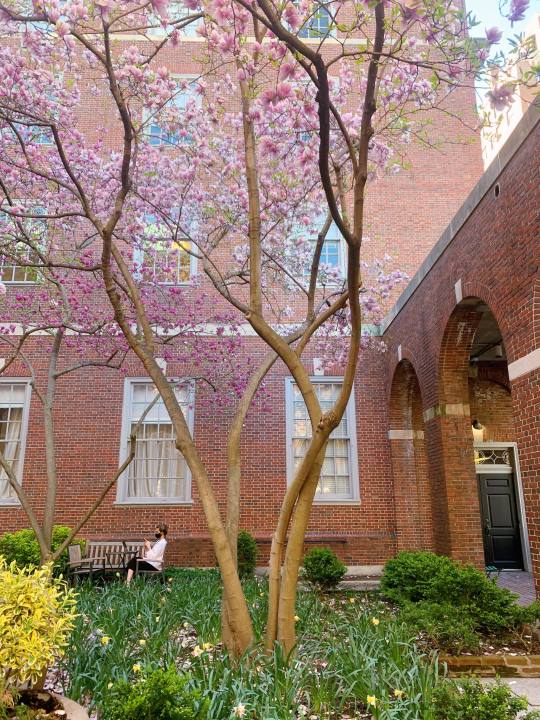
Even the quad has changed so rapidly - from the beautiful magnolia buds above in March, to this equally beautiful summer green of the moment in late April:

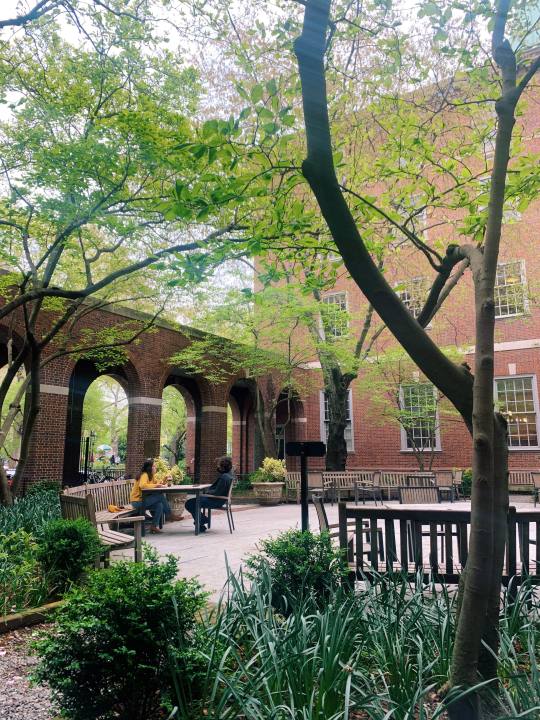
Our graduation is coming up in May, and *very* sadly, it won’t be in person. However, you had better believe I will still be getting photos in my cap, tassel, and gown! And we LL.M.s have planned some informal celebrations, especially as we will all be fully vaccinated by then.
I now am going to drag myself into the library instead of procrastinating, but look out for my upcoming posts:
1. How I got a law firm position in the US (in litigation), and what my other LL.M. friends are doing for jobs post-graduation;
2. Making the most of your LL.M. (there’s a million ways to do it, but this will be some tips from my perspective); and
3. Some of my favorite places to relax and decompress in NYC from my year here. 💃
3 notes
·
View notes
Text
A Day in the Life - NYU Law edition
I am blatantly stealing this idea from my fellow LLM Guide blogger at Berkeley, Nathaniel - but thought it might be helpful for those wanting to see what a day is like here in New York at NYU! This is a Thursday.
Morning
8:00am - wake up, lay around for a bit and feel deathly dehydrated from the built-in radiators in my building 😅There’s a blue sky today, but it is very deceptive - it’s cold!!
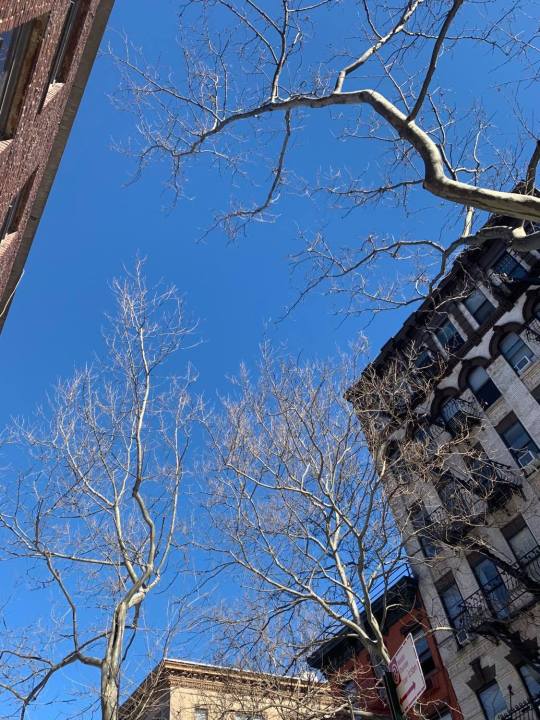
8:30am - make breakfast, usually a smoothie, cereal or avocado toast with a fried egg. Make my bed to feel minimally productive as well.
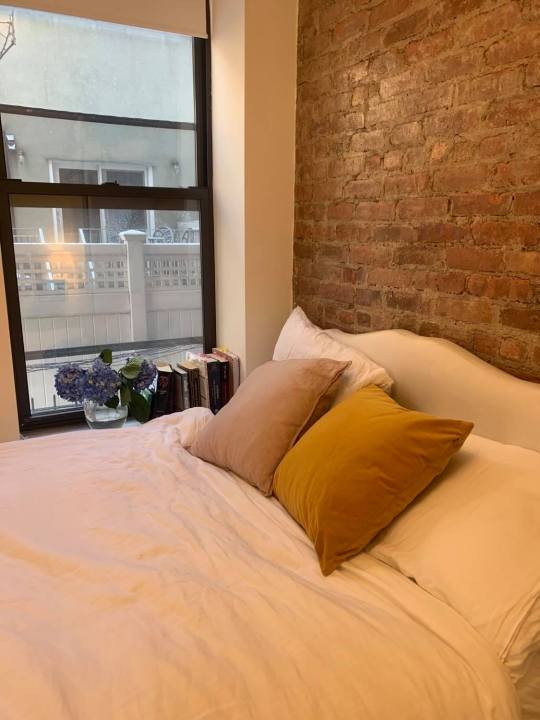
9:00am - Finish off my Constitutional Law readings before my 11am class and make my case briefs (with the facts, holding, dissents, etc for each case). I am very on top of readings for this particular class because my (excellent) professor, Melissa Murray, has a cold-calling system where she calls on people for detailed case-specific questions and hypotheticals without any advance notice. It’s a lot of work, and it probably takes me at least 3 hours to prepare for each of my 2 weekly Con Law classes - but it’s such a great subject taught by a fabulous professor, and I like being challenged to keep up.
10:00am - do an online core workout class through Zoom on the NYU Recreation website - I am much more motivated to do a scheduled class than to fit in a Youtube video, although I miss going to a real gym! A lot of my friends have started going to a cheap gym nearby, Blink, so I might join too.

11:00-1:00pm: Con Law class online with 110 other students. I don’t get called on, but I did volunteer at one point 😃At the moment, we are learning about fundamental rights protection under the Due Process Clause and Equal Protection Clause of the Fourteenth Amendment (protecting individual rights from undue interference by the States). We have just started on the right to procreate and the right to abortion before fetal viability - so the famous Roe v. Wade and other related cases, like Planned Parenthood v. Casey (1992) were the topics of conversation today. It’s all very fascinating.
Afternoon
1:10pm: Go pick up a coffee (latte) nearby from one of my favorite local spots, like Banter, Citizens of Bleecker, Third Rail or About Coffee. It’s not cheap here, but it’s my daily treat! Make sure to keep an eye out for Cuomo....

1:30pm: Make lunch with whatever I have. If I’m feeling fancy, I’ll make some pasta with chicken, or maybe just avocado toast with eggs. I often go for lunch with another NYU LLM friend too and grab some ramen or sushi.
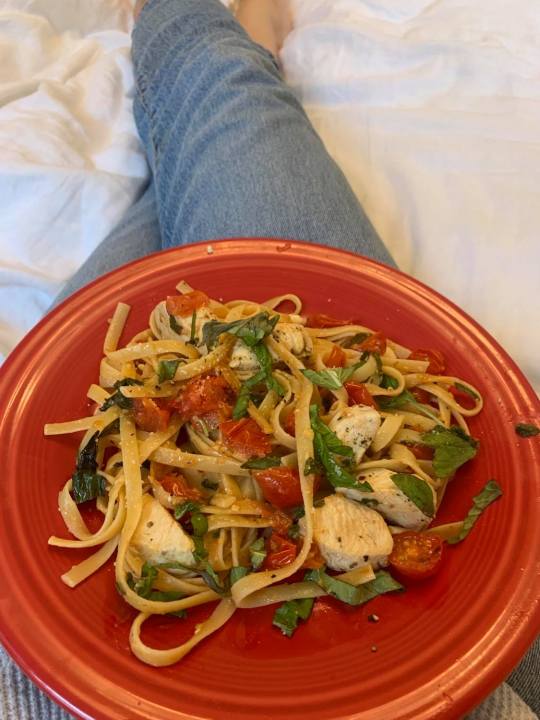
This was a little cherry tomato, basil and chicken fettucine I made 🤤
Here’s a chicken, kale, roast veg, avocado and feta salad I made the other week for lunch as well. I try to eat sort of healthy at home so I can eat allllll the cheesecakes and pizza when I go out.

2:00-2:30pm: Scheduled 1-on-1 check-in with my Government Anti-Corruption Clinic professor. She is fantastic, and we chat about how the class is going, my internship at the Brooklyn District Attorney’s Office Public Integrity Bureau, and my plans after the LLM. She gives me some great job search ideas.
2:30pm-3:30pm: Try to jam in some last minute reading before my Introduction to Civil Procedure Class on Zoom. This is all LLMs and I usually don’t finish the readings before this class, but there is no cold-calling. Sometimes we get to see our professor’s Welsh Terrier, Monty!

On days when I have less class, like Tuesdays, Wednesdays and Fridays, I will often go to the library to motivate myself. I’m studying for the MPRE at the end of March (Multistate Professional Responsibility Exam, a component of the NY and California Bar exams), so I need all the motivation I can get!

When I go on campus, I have to complete one of these daily Covid screeners on my phone, and check my temperature with an NYU-provided themometer. Also, don’t forget your student card!
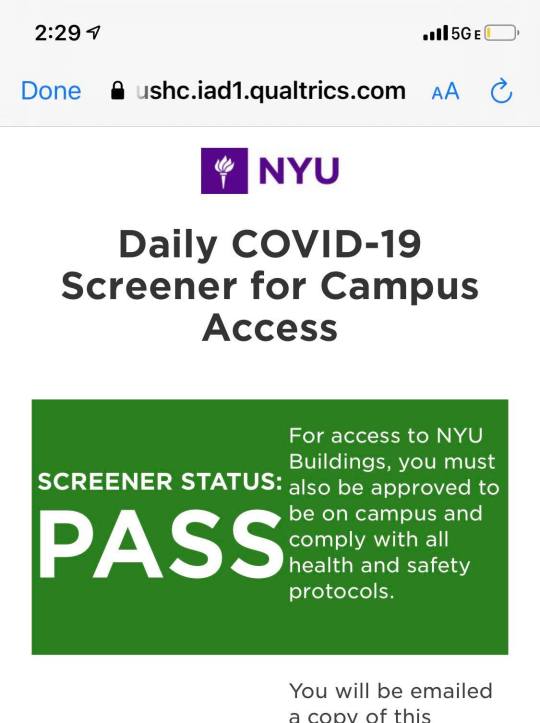
Night
5:30-6:00pm: Zoom call with a Litigation Attorney from my country as a bit of networking. I have a lot of these, and hopefully one will pay off in the form of a job opportunity! She was lovely - I found her through a bit of old-fashioned LinkedIn stalking. Send her my updated resume, and she sends me an email back and some study notes for the bar exam.
6:00-7:00pm: I have a witness preparation session with my ‘co-counsel’ student partner, Jessica (a JD student), and two undergrad pre-law students from NYU for my upcoming simulated trial for my Advanced Trial Simulation class, starting this coming Monday (spanning over two weeks). We run them through the direct examination questions we have drafted as they are playing the role of our lay witness and expert cardiologist witness, as well as cross-examination prep, and our case theory generally. I have a lot of work to do before I am ready to give our opening statement on Monday night, but it’s coming together!
7:00pm-8:30pm: Grocery shopping at a cute grocery store nearby. I love looking at all the freshly made pastas! I made a burnt butter ravioli with walnuts, pumpkin, spinach and sage, but forgot to take a photo of it - so here is all the fresh pasta and then some salmon I made the other week!
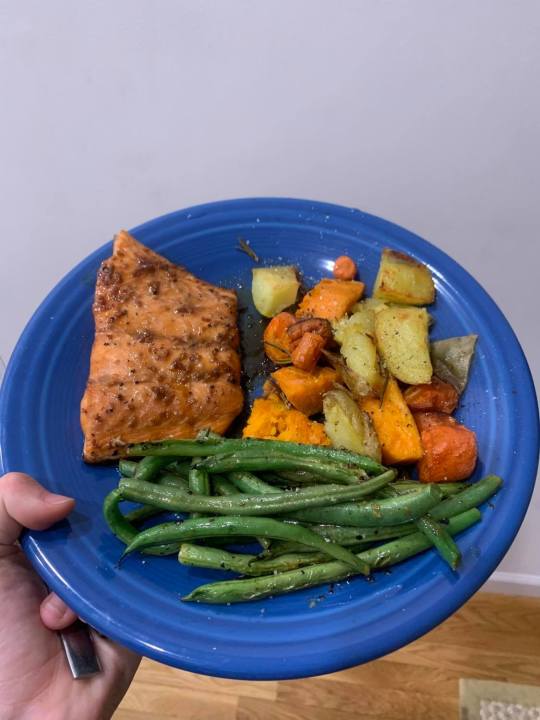

9:00pm- too late: Finish off some small tasks and face-time my good friend back home. She’s just moved to the beach, and I’m very jealous. Plan out my day for tomorrow, waste time on social media, hang out with my boyfriend after he finishes work for the day, and then relax before bed!
Let me know what you would like to see here next!
3 notes
·
View notes
Text
How to Crush Law School Exams as an LL.M.
Hello again!
It’s been a minute. I’ve just had a well-deserved break after finishing my finals, where I managed to get a bit of sun in Florida and Puerto Rico.
It’s been a running start into my final semester of the LL.M. - and I can’t quite believe how fast this has all gone. I have a lot of content ideas coming up about everything I will be doing this semester, including juggling my internship at the Brooklyn District Attorney’s office, a Research Assistantship with an NYU Law Professor, the March Multistate Professional Responsibility Exam (MPRE) for the Bar, a full load of classes, and job hunting/networking - but first things first. I wanted to reflect on last semester’s exams, final papers and overall grades, and think about what I did well, and what I would change!
What are American law school exams like?
I’ll start by giving you an idea of the format of exams to give you an idea of the general approach, and hopefully take away some of the anxieties you as a future LL.M. might have.
There is no uniform exam or grading type for each and every course. American law school professors have a lot of discretion about how they will structure and assess their courses - including what mode of exam you will take (multiple choice, short answers, long problem question responses, policy-based essays, etc), or a final paper, and whether and to what extent class participation counts toward the grade. My assessments ran the gamut. In one class, I had a group assignment worth 30%, a 5,000 word final paper worth 60%, and 10% class participation, and in two others my final exam was worth 100%, with the professor’s discretion to slightly boost your grade based on your overall participation and contribution to the class. My Constitutional Interpretation seminar was 50% class participation, and 50% based on regular pieces of written work we handed in, including a final paper of 2,000 words.
Exams typically last between 2-4 hours, while take-homes take 3-8 hours (I haven’t had a take-home yet, but I will have a 12 hour take-home this semester). We all took our exams from home with a special software (Exam4 or the law school’s own exam software, THESS). Both my exams this semester allowed students to use any notes they wanted, and you could access the internet as well. The main problem with doing that is running out of time! So creating an organized outline of your notes and brainstorming essay ideas ahead of time is pretty crucial.
How do Professors grade? And what is a good grade?
Professors seem to have pretty broad discretion when it comes to grading - and definitely so when I think about Australian law school professors, who grade ‘blindly’ and never know who is behind the student number unless they look it up later, or are awarding prizes for the top students. The possible grades at NYU range from an F to an A+, as follows:
A+, 4.333; A, 4.000; A-, 3.667; B+, 3.333; B, 3.000; B-, 2.667; C, 2.000; D, 1.000 and F, 0.000.
No more than 2% of students can get an A+ in a given class, with a target of 1%. I am proud to say I was the only A+ student in one of my classes - yay! A huge personal achievement for me, and so I will brag a little here because I don’t want to be lame and brag in real life!
About 10% of people get As, and another 20% get A-s, and about 26% of people get B grades (B+, B, or B-). B- and C grades are actually pretty rare, so in all likelihood you will likely end up with an A or B grade of some sort!
It’s kind of hard to work out what ‘good’ grades/a strong GPA are for job applications, but from what I’ve gleaned, in an ideal world you would have all A level grades, or maybe one B+. Personally, my grades were an A+, 2 A- grades and a B+. This gave me a GPA of around 3.8, which is definitely decent for job applications.
Your chances to get the high grades will depend a big deal on your competition - in the core doctrinal courses (like Constitutional Law, Free Speech, Evidence, Corporations Law, and so on) and in classes of the really famous professors, JD competition is intense. I definitely didn’t make it easy for myself with my classes, and I was usually the only, or one of two, LLMs, along with pretty ambitious JDs (often from elite undergrad schools) aiming for judicial clerkships or other prestigious jobs. Many LLMs have usually been working hard enough back home, and work hard enough to get decent grades, but leave enough time to relax and enjoy themselves. I would say my approach was mixed - I knew I needed to work hard enough to get good grades to make me a strong candidate for job applications in the US, but I also had plenty of fun. 😄 Just less fun around exam time!
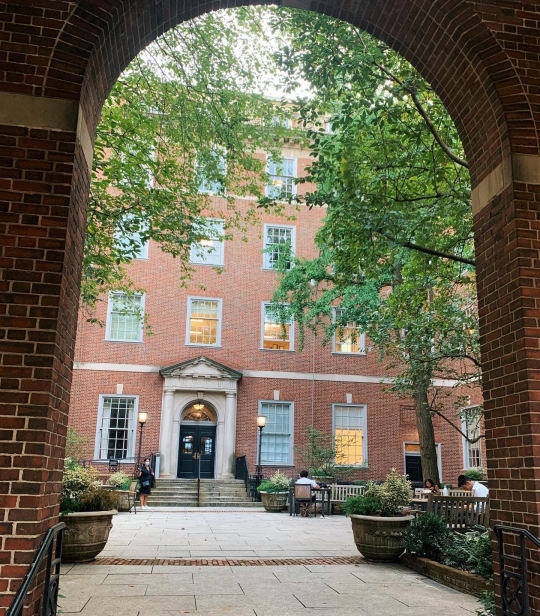
On reflection, my top tips for doing well in your classes and exams would be:
1) Play to your strengths
At the time you select your classes, you’ll be able to see what the format of the assessment is - long paper, exam, practical assessments (like in a clinic or simulation course), etc. My top advice would be to think about your strengths when picking classes.
I have always been much better at hand-in assignments, and my one A+ grade was from handing in a long paper. My lowest grade (a B+) was from a very time-pressured exam that I wasn’t happy with how I handled the timing. So - if you know you are much better at one type of assessment, make sure you are considering this when picking classes to pave the way for great grades, especially if you are relying on your grades for finding a new job or for a JSD application.
2) Understand your professor’s idiosyncratic preferences
When it comes to law school exams, the key to succeeding is really knowing who’s grading them. Some professors prefer you to be ‘quick and dirty’ and to really jump into the key issues and answers, while others prefer a more formalistic recitation of the rules and then a close application of the rules to the facts. Pay attention to how they explain what they want, pore over any model answers and exam keys they give you, be familiar with the way they write problems, and ideally hunt down past students’ papers with comments or overall feedback from the professor (if you know anyone that took the class before).
3) Make study enjoyable and social
Even in these COVID times, I really benefited from spending time at the library studying with LL.M. friends, and broke up study sessions with coffee hangs, lunches, and going to see the Christmas lights. Your friends will keep you sane and motivated, so don’t hide yourself away for the whole month or more!
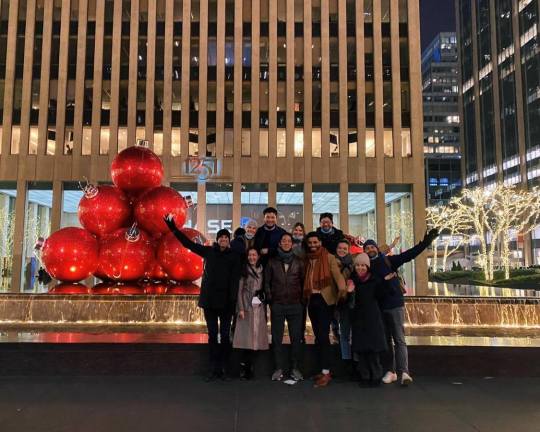
Friends! A well-deserved dinner break in December a week or two before finals.
4) Argue both sides of legal issues you spot
This is something that is really emphasized by NYU professors. A good lawyer can, when identifying a legal issue, show how it is a weak point in a plaintiff’s claim or in a defendant’s defense, and then demonstrate how both sides could argue their case. The best answers don’t ‘fence sit’, but come to a reasoned judgment/prediction about which side of the argument is stronger.
5) Be precise and concise
You should try not to include unrelated material in your answer as this could backfire if your professor believes you struggle to separate relevant material from irrelevant material. One of my professors was clear ahead of time and said he did not appreciate an ‘info dump’ and graded accordingly, but I think this is true of all professors.
6) Be *really* aware of your timing
I can’t stress this enough. Effective time management is imperative on law school exams. My Evidence exam was so unbelievably time-pressured (27 short-answer questions in 3 hours = less than 7 minutes per question to read a few sentences-long question and answer it), and I did not handle this as well as I could have, affecting my grade. Make sure to be really aware of this and try to be strict with yourself so you don’t leave any questions untouched.

7) Remember public policy concerns
After applying the legal rules to the issues presented in your fact pattern, if time allows, include a sentence or two about the policy implications of your conclusions, or how your chosen approach fits best with the policy rationale underpinning the legal rule. This is something that is valued more in US law schools than my law school back home. Not critical, but definitely something that could boost your grade a little!
8) Just try your best, and don’t be too hard on yourself
We have all worked hard to be here, and we put a lot of pressure on ourselves. English might not be your first language, you might struggle with exams, or it might just not be the best day you’ve ever had. If you find yourself in the unfortunate position of either not understanding the issues presented in a question, or not remembering the rules related to such issues, just do your best to write the best possible answer in the time limit.
Good luck, and let me know if you have any questions!
6 notes
·
View notes
Text
Revision tips: law coursework

During the course of my LLM I soon realised that I was stronger at writing coursework than I originally gave myself credit for. In most of my attempted coursework pieces I achieved distinction grades, and in my final dissertation I obtained 68%. This blogpost outlines some of my best tips for writing an excellent piece of coursework.
1. Structure
Structuring your essay is key. You need to take the time to plan the sections of your essay. Broadly, these sections fall into: the introduction, main body and conclusion.
A. Introductions
Your introduction should address the question and lay out the arguments you will cover in the main body of your essay. You do not want to focus on addressing too many arguments, since this will make your essay superficial. Rather, you need to be engaging in depth with the arguments you present.
Now, this may be difficult if your essay question is very broad. To address this, you may want to narrow the scope of your work. For example, by stating, ‘ this essay will focus on A,B and C factors, as they pertain to topic D. It is argued that these factors are most relevant to topic D since….’
Another way to narrow the scope of your work is to make your argument ‘contingent’. What do I mean by this? Well, one of my essay questions was as follows:
‘Roe v Wade represents the best possible solution to the abortion question, and should be adopted by other national courts- discuss.’
This question required me to, from the outset, define what I believed the ‘best possible solution’ to the abortion question was. I therefore made my argument contingent, stating: ‘Whether Roe v Wade can be deemed to offer the best possible solution to the abortion question and therefore ought to be adopted by other national courts, is contingent on whether the following can be satisfied: that the United States Supreme Court engaged in conceptually sound reasoning, where such reasoning has given effect to the autonomy rights of women, etc.
B. Main body and conclusion
You are encouraged to use subheadings to structure your LLM work. Using my example above, my subheadings were: ‘ Roe: abortion as a privacy right’ (addressed the United States Supreme Court’s reasoning) and ’The implications of Roe: feminist critiques’ (addressed whether Roe gave effect to the autonomy rights of women amongst other feminist criticism) and so on.
2. Theory
Whilst you might not need to incorporate legal theory into every essay you write, in my experience undertaking human rights based modules, extra credit was always given when I showed a sophisticated understanding of legal theory.
What do I mean when I say legal theory? Well it depends on the module you are studying but, for example, when talking about ‘rights’ in general, you might want to discuss what a ‘right’ truly is and how conceptions of it have differed over time, with reference to several academics such as Moyn, Donnolley, and Jackson.
When I was discussing Roe v Wade, I made sure to include feminist theory, in particular, writing about ‘intersectionality’, a particular subdivision of feminist theory that looks at the interaction of race, class and gender.
3. Arguments and opinions
Another sure fire way to get a good grade is to ensure that you are comparing academic opinions AND offering your own opinion as to whether an academic opinion is convincing.
A good formula may look like this:
A. State your argument
B. Counter argument What have critics said that might challenge your stance? Or, what weaknesses can you foresee with your argument?
C. Counter your counter argument Dismiss the challenges made against your argument- point out why they are weak
4. The bigger picture
It is always worth appreciating the bigger picture. By this, I mean that your essay should, at least briefly, discuss why the topic you are writing on is of legal and social importance. You should appreciate the real life implications of the topic you are writing on. For example, in discussing Roe v Wade, I discussed the extent to which it is useful to have a ‘right’ to have an abortion if practical access to an abortion is limited.
8 notes
·
View notes
Text
Extracurricular Activities
An LLM student can engage in a wide range of activities at LSE. The centre of social life here is the Students’ Union comprising more than 200 societies. They include national and cultural groups, special interest societies uniting those who enjoy things ranging from hitch-hiking and yoga to wine and chocolate, or academic ones dedicated to competition law, venture capital and many more.

In order to join a society, you need to pay a symbolic fee which usually amounts to 1.5-3 pounds. Once you are a member, you get regular updates regarding society’s upcoming events via email. Each society has a committee that gets re-elected annually, so if you join early enough in the term, you can apply for a position within it.
Law society is probably the most popular one among LLM students. It not only organises festive (and not-so-festive) socials throughout the academic year, but also a wide range of career events such as application workshops, breakfasts with law firm representatives and other recruiting events. This term I attended law society’s flagship event called Know the City Legal Forum which took place at Allen Overy’s office. The event consisted of panels and Q&A sessions delivered by lawyers who work in the city to demystify the term 'commercial awareness'. I found it very useful because it provided an insight into the different practise areas and sectors as well as the state of the market and pro-bono opportunities offered at magic circle law firms. That particular event, like many others organised by the law society, also gave students a chance for informal networking with legal professionals.
The other group that I’ve joined is LSE Pro Bono Matters. It’s a postgraduate group that volunteers to work for social justice, protection of human rights and furthering public interest causes. This student organisation is coordinated by the law department. As its members, our main role is to assist internal and external organisations and practitioners on human rights cases and international strategic litigation as well as doing research and writing reports for non-profit organisations. I’m very excited to be part of it and we’re currently doing research for a project on reunification of child refugees with their families in the EU.

Finally, I’d like to briefly tell you about Students’ Union facilities. Apart from a couple of stores, in one of which I saw this beaver toy (which happens to be LSE’s mascot), there is the main building which comprises several cafes, study spaces, a faith centre where you can go to pray and a gym.
I personally prefer the 6th floor cafe of the Students’ Union building to the LSE library. Although it’s much smaller and it gets pretty loud there at times, the cafe is very cosy and I find it easier to concentrate when I study there. Plus, if you get hungry, you can eat right there without having to think about where to leave your stuff while you exit the library in search of food. But it’s clearly a matter of choice - some of my classmates find it harder to study anywhere but the library or their room.

As I’ve mentioned above, there is also the gym. Although I admit that having purchased a membership I hardly went there because of the amount of studying I had to do for my modules, it’s always very refreshing to engage in physical activity after a long day of lectures and seminars.
3 notes
·
View notes
Text
Living in London: the search for student accommodation

The search for accommodation as a postgraduate student is incredibly difficult.This blogpost outlines things to be aware of if you are house searching as a student in London, and provides tips to help you on your search for a place to live.
1. Undergraduates get priority
Perhaps the most important thing to note is that, at least at UCL, undergraduates get housing priority in UCL/University of London run halls. This means that undergraduates are essentially guaranteed housing, whereas postgraduate students are not. From the outset, this limits your options: you can either get a room in privately run halls, or flat share with other students.
2. UK vs International Students
As an International student, you may stand a better chance of securing accommodation in halls run by The University of London/UCL. Some halls such as International Halls and Goodenough College, though open to applications from UK students, are (in my experience) more likely to offer accommodation to international students.
3. Cost effectiveness
There are pros and cons to both living in postgraduate halls and flat sharing. In terms of determining which option is most cost effective, it is safe to say that postgraduate halls are generally more expensive, with prices typically starting from £830 per month. House sharing is typically cheaper- though prices will of course vary depending on a number of factors including location, the number of rooms in the house, etc.
Despite the fact that postgraduate halls are likely to be more expensive than house sharing, halls are typically located in central London areas, and may therefore be considerably closer to campus; this was at least my experience staying in a private hall that was a mere 10 minutes walk away from UCL. Because of the ideal location of my halls, my travel expenses were limited. In this sense, it is definitely worth factoring in travel costs when thinking about where to live.
4. Where to search
I have outlined, as a starting point, where to search for accommodation as a student.
UNDERGRADUATES
A. Halls Intercollegiate UCL undergraduate halls (see UCL website)
POSTGRADUATES
A. Halls UCL postgraduate halls (see UCL website) - note that priority given to internationals students Goodenough College International Halls International Lutheran Student Centre Various privately run halls (UNITE Students, Urbanest, iQ, etc)
B. Flatsharing University of London Housing Services (look at the Housing database)
5. Applications for halls
If you want to live in halls, you should be aware that the application process will vary depending on where you are applying to live. For example, Goodenough College and the International Lutheran Student Centre will require you to explain how you would, if selected to live at their halls, contribute to their community. Contributions often take the form of agreeing to attend group social and sports events. The International Lutheran Student Centre is, as the name suggests, a Lutheran run hall. Because of this, they do ask you to state your religion if applying- but it should be noted that they accept students of all religions.
4 notes
·
View notes
Text
On Choosing Courses

Prior to my arrival at LSE, I did a couple of internships in corporate law. I realised that I liked the field and wanted to deepen my knowledge by studying it at a postgraduate level. However, I knew that I did not want to limit myself to it only. I wanted to explore areas of law completely new to me, which would sort of make me get out of my comfort zone. That is why I decided to enrol in finance courses as well. So far, I did not regret my choice even for a minute, even though, I must admit, it has been far from easy for me.
I ended up choosing two finance courses - The Law and Practice of International Finance and International Financial Law. At first I feared that it might be too much for me or the courses may overlap, but turns out that they do not, and, on the contrary, compliment one another very nicely. They are taught by two different professors, both of whom I find to be brilliant.
As someone who knew very little about international financial transactions and had no clue as to what distinguishes net positions from asset-backed ones (still not sure, but I am working on it), I felt pretty lost at first. But gradually, having attended introductory lectures and started reading up on the subject, I realised I can do this. The world of international finance always fascinated me cause it is the area of law that is constantly in the news and has basically become a part of popular culture by now. At the first lecture professor referred to the Big Short movie several times while talking about financial crises. It also inspired me to subscribe to Economist. You may want to ask why I did not subscribe to Financial Times instead, which would be a more obvious choice in this context, but LSE gives you free access to the digital version, so I had no need to do that.
I am also very pleased with the fact that LSE Department of Law is currently running a series of extra-curricular lectures for LLM students on the Law and Regulation of FinTech. One of its topics is the challenges posed by the use of artificial intelligence in finance, and how they can be addressed through regulation. It is a nice bonus to the discussions that we have in class.

This is my experience, however, a lot of people in my class made a different choice and enrolled in a wide variety of courses. For instance, one of my friends is studying Art Law as well as Climate Change and International Law, even though the rest of her courses are all commercial law-related. I find both of these subjects fascinating, and initially I was tempted to take them up too, but after thinking it over, I realised it would not be beneficial for me. The thing is that I personally would be very stressed out if I needed to delve into such different areas of law, on top of my corporate law courses, and probably would feel like I am spreading myself too thin. But a lot of people feel at ease with it, so it really depends on what kind of a person you are.
1 note
·
View note
Text
Where to eat in London
Without doubt, London has an incredible range of cafes, restaurants and food markets. This blogpost outlines a few of the places I visited, with recommendations for breakfast, lunch and dinner.
BREAKFAST/BRUNCH:

Breakfast/brunch in London is pretty expensive. There is no escaping this; a simple coffee alone can easily cost you £4 if you’re at an independent coffee shop. Nonetheless, during my time in London I sampled multiple breakfast/brunch spots, including the following:
1. HALF CUP
Half Cup is a short walk away from Kings Cross station. It is a relatively small cafe offering a range of food and drink, from cakes, speciality teas and coffees to breakfast and brunch foods. My favourite dish was the charcoal bread with avocado toast and cherry tomatoes (pictured above).
2. GRIND
GRIND is a chain cocktail and espresso bar, as well as an all day restaurant. One of the things that sets Grind apart from other cafes is it’s interior design. The spot is particularly ‘instagrammable’, with its modern interior. Notably, the restaurant offers bottomless brunch, providing a definite excuse for anyone wishing to indulge.
LUNCH:
3. STREET FOOD
There are a plethora of food markets scattered across London. Whilst Camden Market is perhaps best known, there are numerous excellent markets including the Duke of York Square Food Market and Kings Cross Market.This summer I visited the Kings Cross Market a few times, sampling vegan rolls, cannolis, and doughnuts. All in all, you will find relatively well priced fast food at these markets.
DINNER:
4. WING WING
If you’re looking for good fast food, I would recommend Wing Wing. Wing Wing serves Korean style fried chicken, bao, and other excellent comfort food; even more promising is the fact that Wing Wing is on Deliveroo, so you can enjoy their food from the comfort of your own sofa.
5. NORTH ATLANTIC FISH AND CHIPS
Is there anything more British than fish and chips? This fish and chip shop was situated incredibly close to my flat and became a regular of mine. The establishment offers either a take away or restaurant experience. Refreshingly, the prices are very reasonable and the food is always high quality.
6. DISHOOM
Of all the restaurants on this list, you will have most likely heard of Dishoom. Dishoom is a well known restaurant, paying homage to the ‘Old Irani Cafe’s of Bombay’. Dishoom is a chain restaurant within London and offers excellent food- both for meat eaters but also for vegetarians. Whilst Dishoom is on the dinner section of this blogpost, it is worth noting that Dishoom offers an excellent Indian breakfast. If you feel like adventuring beyond avocado toast- Dishoom may be worth a try.
7. HOMESLICE
Homeslice offers some of the best pizza in London. One pizza is easily enough to feed two people, and you can choose to have different toppings on each half. For the amount of food given and the quality of the pizza, Home Slice is excellent value for money. Moreover, the relaxed atmosphere of the restaurant makes it somewhere you’ll want to re visit.
DESSERT:
8. SAID DAAL 1923
If you are a chocolate fiend then you will love Said Daal 1923. Said Daal offers chocolate goods in almost every form: from artisan chocolates to chocolate covered doughnuts, and specialty hot chocolate. What should be noted is that the cafe is relatively small; as a result the cafe is prone to long queues; nonetheless, if you have a sweet tooth you should absolutely visit Said Daal.
2 notes
·
View notes
Text
Settling In
The first month of my LLM journey was so busy and eventful that until now I’ve hardly had time to reflect on it. Adjusting to my new life as LSE student has been a little overwhelming, but very exciting: registering for the program, choosing modules, meeting fellow students from all over the world during welcome events and many more.
Prior to my arrival in London, I had doubts as to whether it’s a good place for a student as opposed to small university towns with slower life pace. But despite being situated in the city centre, right next to the Royal Courts of Justice, LSE campus has a very peaceful vibe which makes you forget that you are in one of the busiest world capitals. Plus, I feel very lucky to be living in a student hall within 5 minutes walking distance from LSE, and also very close to Covent Garden and the theatre district.

Due to the fact that the LLM program is very international, with students from different backgrounds, during the welcome week we had introductory lectures about the English legal system and EU law. Also, I found very helpful postgraduate law option fairs that were designed to help students decide which modules to choose for the year ahead. In essence, each professor did a short presentation of his/her module(s), and after that took questions from the audience.
At LSE you are expected to complete a total of eight courses, one of which is compulsory for everyone - Legal Research and Writing Skills. The latter will be assessed by a master dissertation to be submitted by the end of summer. What I found peculiar is that you can write your dissertation on any legal topic irrespective of your chosen modules. However, if you wish to focus on a particular area of law and have a specialism to your LLM, your dissertation topic has to fall within it.
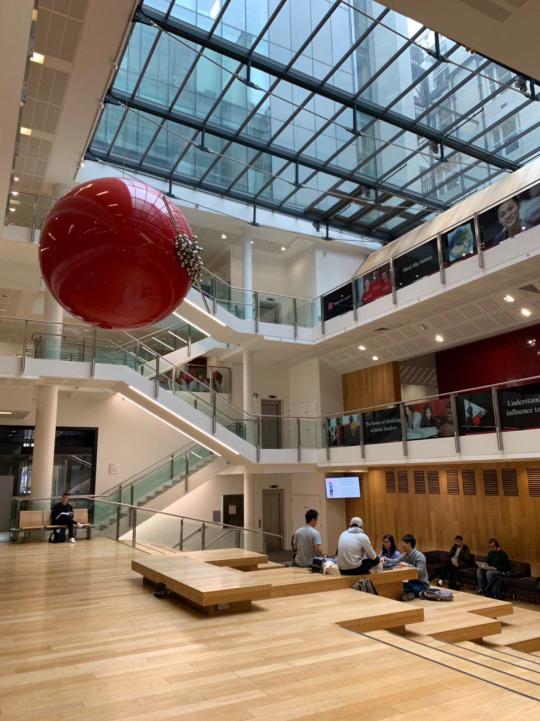
Also, each student on the LLM is assigned an academic mentor from the law department who you can turn to for advice. Basically, your mentor keeps track of your academic performance and general wellbeing throughout your time at LSE and regularly contacts you to arrange meetings. Interestingly, your mentor is often specialised in a different area of law than the one you choose to specialise in at LSE, however, it doesn't preclude them from giving you valuable advice on course choice and other aspects of your academic life.
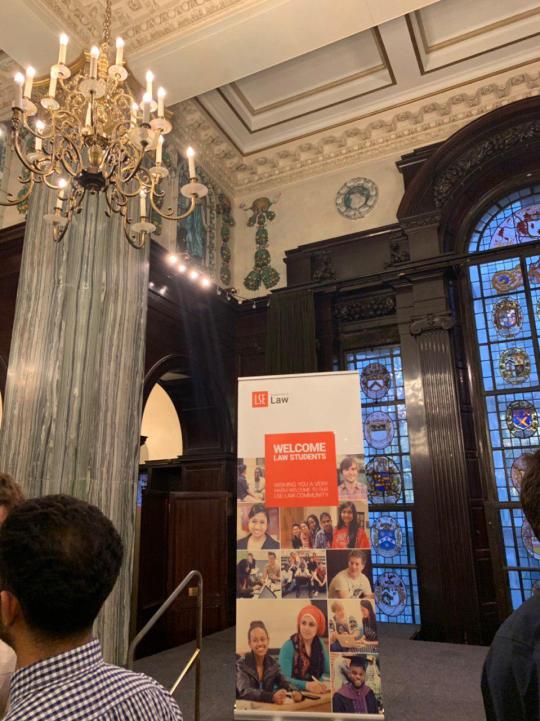
One of the highlights of my first weeks at LSE was a welcome reception at the Law Society on Chancery Lane - home to professional body of solicitors in England and Wales. Despite the fancy setting, it was a great opportunity to socialise with law department professors in a rather informal way and commemorate the start of this exciting new life as LLM students at LSE.
Coming from an education system where the relationship between students and their professors is supposed to be very formal, I find it helpful to be able to approach your teachers and talk to them outside classroom.
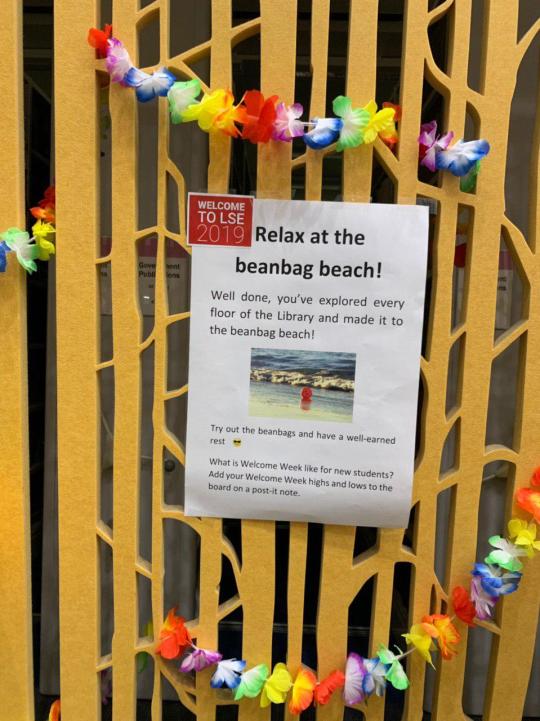
The weather in London is infamously gloomy (mostly) this time of the year, which makes it easier to stay in the library and study for long periods of time without being distracted. But if you do get tired, there is always the option of lying on the beanbag beach :)
1 note
·
View note
Text
California, Brussels, London, New York and more: A look at the next career moves of the NYU LLMs
In my last post, I wrote a little about the crazy hustle it took for me to secure a dream role in litigation in my target city - Los Angeles, California. Everything about the journey to establishing my eligibility to sit for the California Bar exam (not a well-traveled path for NYU LLMs), and to get in the (Zoom) door and start interviewing in LA was tricky.
Ultimately, though, I really feel that my experience aligns with those of people I’d spoken to in previous years who secured a great role after the LLM, especially in NYC. In short, perseverance (even after you have almost given up), and *especially* networking (with connections from back home, people you meet here, and contacts of your professors), are critical. If you keep working at it every day, it will pay off.

I thought it might be helpful to write a little round up on the next career moves of some of my friends and peers in the NYU LLM now that we are graduating this week! This talented bunch is spreading across the globe, and I can’t wait to visit many of them once the world opens back up. Their exciting new opportunities is a testament to hard work and grit.
Bear in mind that we had a smaller group of Fall starters!
For their privacy, I have identified them by first initial and country of origin rather than their full name 😀:
1. Me (Australia): I was looking for a role in litigation in a private firm in Los Angeles - ideally a second-year role, but I was flexible about coming in as a first-year. I received two offers at firms in LA (at a boutique and a global firm) and chose to accept the second-year offer at the trial-focused boutique firm for a September start - and I’m very excited! I will sit for the California Bar exam this July.

2. U (South Korea): U secured a great OPT role at an elite litigation firm in NYC, Kobre & Kim, which focuses on international disputes and investigations. He will work in their office for 6 months-1 year before returning to Seoul to resume work at his previous firm. He is sitting the NY Bar exam this July.

3. V (UK - England): V was a younger LLM fresh out of law school in the UK (not yet qualified in the UK), and a dual English and French speaker. He was looking for a role specifically in antitrust in New York, D.C., the UK, or in continental Europe. He didn’t have previous experience in this area, but took many classes focuses on antitrust, tax, and constitutional law (an area of interest) during the LLM. Unfortunately, he didn’t have success in finding a US-based role due to his inexperience at this stage in antitrust (and he also realized how exceedingly difficult it would be to establish eligibility for the D.C. bar due to the number of credit points you need to take). However, he has accepted a fantastic role at a prestigious US-headquartered global firm in Brussels, Belgium (Skadden) where he will be working on European and US antitrust cases, and is very excited about it. He is sitting the NY Bar exam in July.

4. V (France): V had just sat for his examinations for the French Bar during the Fall, and had interned at some prestigious firms in Paris for a total of about 2 years. He was looking for a role in corporate/transactional law. He has accepted a great role at Paul Weiss in London in Corporate.
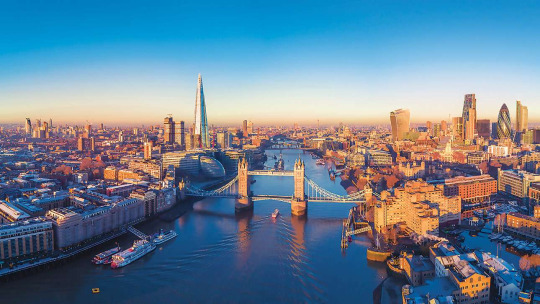
5. J (Germany): J is a fully qualified German lawyer who successfully defended his PhD back in Germany over the winter break while completing the NYU LLM (not impressive at all....!). He was looking for a role in NYC or Germany specifically in white collar criminal defense, and his classes at NYU were almost exclusively in this area. He accepted an exciting opportunity in Frankfurt, Germany at a prestigious white collar defense litigation boutique. He is sitting for the NY Bar in July.

6. K (Japan): K had a fully-paid scholarship from the Japanese Government for her LLM at NYU, and another year pursuing a Masters of Public Policy or Public Administration. She applied during her LLM for the MPP or MPA and ended up choosing to enrol at Tufts in Boston for the MPP for 2021-2022. She interned for the OECD and the US-Asia Law Institute during the semester, and secured an internship at the World Bank for summer. She will return to Japan after her year at Tufts.

7. D (South Africa): D’s background was in litigation and policy (including as a judicial clerk at South Africa’s Constitutional Court, working at a private firm, and advising the government on the constitutionality of laws). He secured a competitive summer fellowship at the UN through the NYU IFD Fellowships program, and will use that time to decide about pursuing the MPhil degree at Oxford, or exploring work opportunities in South Africa or the US.

8. S (Singapore): S attended NYU for the LLM as part of her degree at NUS. She has not worked extensively yet, but is returning to Singapore to attend the mandatory classes for the Singapore Bar. She will work at Baker McKenzie in Singapore after that.

9. P (France): P graduated from the Sorbonne in Paris. He will be pursuing a UN Internship over the summer in NYC and sitting for the NY Bar, and is looking for opportunities in NYC or D.C.
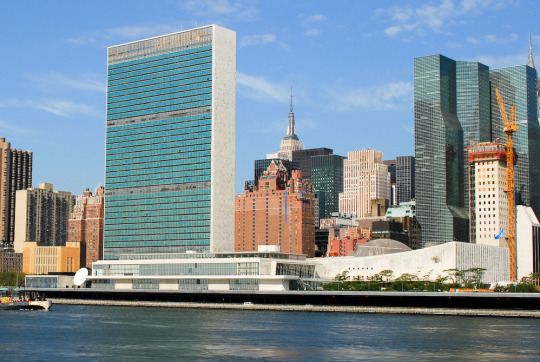
10. H (UK - England): H is returning to a pupillage at a fantastic barristers’ chambers in London to pursue her stellar career in human rights law. She is genuinely the next Amal Clooney (an NYU LLM grad, by the way!).

11. L (Canada): L is a recent graduate of McGill, and hails from Montréal. He is particularly interested in arbitration and litigation, and locked down a fantastic role at a Montréal-based French firm called DS Avocats as an articling student on his way to being admitted to the Canadian Bar. He is also sitting for the NY Bar in July.

12. E (UK): E had been an intern at some prestigious firms in London and had a mini--pupillage under his belt, but was looking for a long-term role in M&A in a New York BigLaw firm. He did an internship at the Securities and Exchange Commission (SEC) in the Spring semester for NYU credit. He started the job search later, as he started the LLM remotely from London, but found his ideal job as an Associate at Davis Polk & Wardwell in NYC in M&A, starting in October this year. He is also sitting for the NY Bar.
13. Z (US): Z had graduated from a Top 25 Law School in the US (not Top 14) and wanted to focus more on his areas of interest - Art Law, Media Law, and Fashion Law. He secured a role as an Associate at Latham & Watkins in NYC starting in October 2021.
14. M (UK): Formerly based in Singapore, M secured a fellowship at the International Law and Development Foundation and is still based in NY. He is also sitting for the NY Bar.
15. H (Australia): H formerly was a lawyer at Baker McKenzie in Sydney and wanted to shift to a focus on cyber law and privacy, and was not looking for jobs in a law firm. She is staying on in NYC to be a Research Fellow at the Guarini Center in Global Law & Technology, and then will consider whether she wants to return to Australia or stay on in NYC. She is also sitting for the NY Bar.
16. M (Italy): M is from Sardinia, and had been working as a foreign associate in NYC for an Italian law firm for a few years before the LLM, working on cross-border M&A. She secured an Associate role at Fried Frank in NYC focusing on corporate finance.
17. G (Italy): G had been practising in Milan, focusing on Intellectual Property Litigation, and wanted to work for a year or so in NYC before returning home. She secured a role as a Foreign Associate at Cleary Gottlieb Steen & Hamilton in NYC in IP on the transactional side, and is really enjoying it so far.
18. D (India): D wanted to find a role in NYC or London in Corporate/Transactional law. She is now working Ropes & Gray in London in the High Yield team.
A few more LLMs (including from Greece and India) have opportunities back home but are still looking for roles while they study for the NY Bar exam. I have no doubt they will be successful.
I hope this was helpful!
0 notes
Text
Spring has finally sprung in NYC!
Now that we’re in late March, the snow has thawed and the feel of spring is in the air! Everywhere I go, I see beautiful spring blooms - daffodils, cherry blossoms, pansies, and petunias - and we’ve had some beautiful warm days recently. As in 27 degrees Celsius this past Friday 🤩🌸
I've been able to enjoy long walks and runs by the water in my new neighborhood of Brooklyn Heights, sunny outdoor lunches with a few LLMs, and nice picnics, like one in McCarren Park in Williamsburg (Brooklyn). It feels like everyone is out and about. With the increased vaccinations across the city and this gradual warming up, good vibes are high!
I know many of you are about to choose your law school for your LL.M., so here are some spring pictures to make you fall in love with NYC!

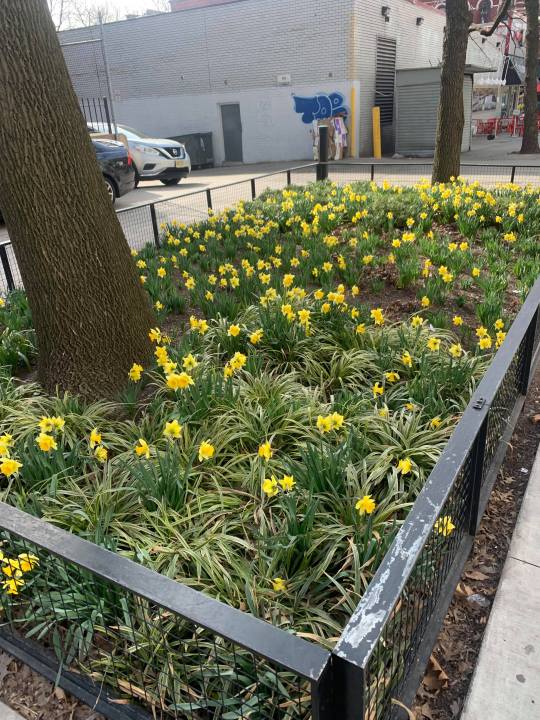
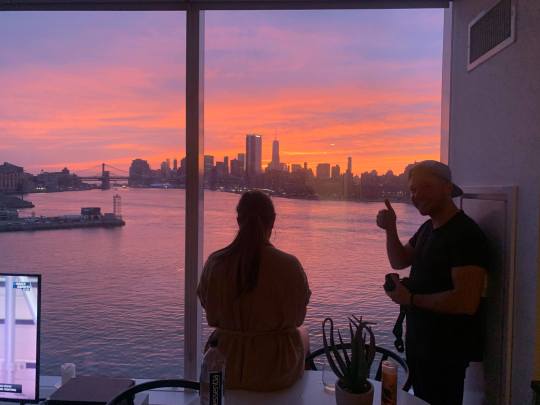


McCarren Park
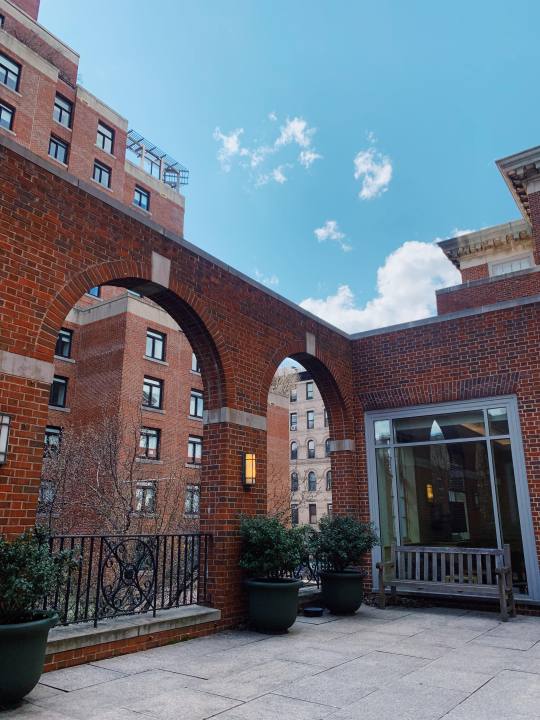
NYU Vanderbilt Hall terrace in the sun 🌞

Wildflowers on the Promenade in Brooklyn Heights.

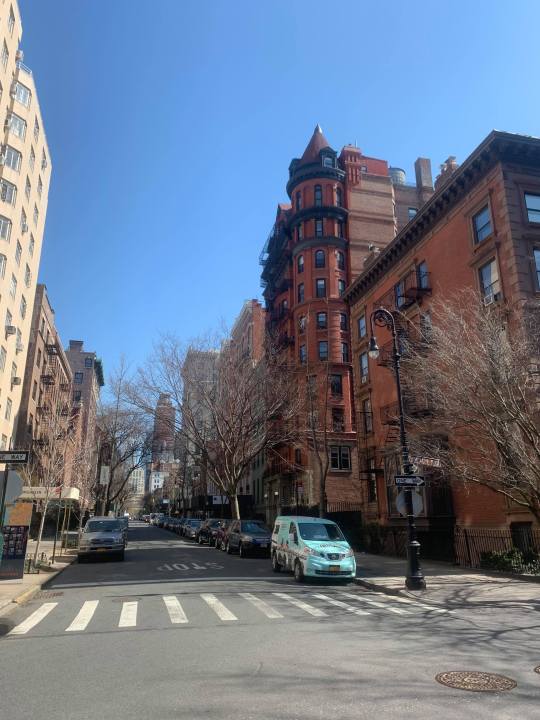
I also recently took a trip with a few friends to a home in the woods a few hours upstate, complete with a campfire (and toasted marshmellows, of course), hot tub, lots of hiking, and exploring some of the cute towns in the Hudson Valley. I highly recommend Cold Spring and Beacon!
We still have a few weeks before things get busy with studying for finals, but I’m sitting the Multistate Professional Responsibility Exam (MPRE) this coming Tuesday (a component of all state bar exams, including NY and California). Fingers crossed!
0 notes
Text
Let’s talk about housing
A big question in the minds of many LL.M.s when they are making the leap to move over to NYC is whether to opt for university housing, or to go it alone.
Fortunately, I have (with my elementary school maths skills) done the breakdowns on the cost of each option to help you in your decision (using NYU’s current semester rates found here). There are, of course, many other factors that go into this decision, and I’ll cover some of those below too.
Full disclosure - I decided to go it alone, and I’m living in a 2 bedroom, 1 bathroom apartment in Soho (6 minutes’ walk away from NYU Law buildings) with a lovely American girl from Philadelphia who I found through a Facebook group called Gypsy Housing.
Here’s my room! I have another window too... great natural light was a huge factor for me. You can also clearly see my plant obsession 🌿:

Let’s see it from another angle....

There’s that classic NYC view!!
Option A: Hayden Hall or D’Agostino Hall
If you decide to live in an NYU residence hall during your LL.M., you have two options - D’Agostino Hall or Hayden Hall.
This is D’Agostino (the older building, which is directly behind Vanderbilt Hall at the law school):

And this is Hayden Hall, which is a few minutes’ walk away on West Third and Mercer St:

Here are the floorplans and photos for Hayden Hall (the newer building) and D’Agostino Hall, and here are video tours of Hayden and D’Agostino.
There is a wide range of prices available for the different room options, ranging from:
$8,073 per semester for a bedroom in a 3 bedroom suite with 1 bathroom in D’Agostino Hall, ($16,146 per academic year, plus extra for early arrival before 19 August) to
$15,784 per semester for a 1 bedroom apartment in Hayden Hall ($30,568 per academic year, plus extra for early arrival before 19 August).
Dividing each of those by 9 months, that gives approximate prices per month (how Americans give rent figures) of:
roughly $1,800 per month for the first option; and
roughly $3,550 per month for the second option.
Option B: Off-campus accommodation
Here is the good news. It has never been a better time for you to be looking at renting or sub-letting in the Big Apple!
As a result of the COVID-19 related exodus from the city, as of mid-August 2020 there were over 67,000 apartments vacant across the city, and rents have dropped between 3-10%.
I decided to look elsewhere for accommodation based on a few key factors:
NYU rates are in my opinion not cheap - you can find plenty of options that are well within the same range, or if you’re willing to go further afield, like Chinatown, Nolita, Uptown or Brooklyn - much cheaper than $1,800 to $3,550 (we’re talking more like $1,100 - $1,550 per month in a 2 bedroom + place, based on my extensive stalking of listings and on Facebook groups for the last 4 months). Even if you are looking for a place on your own, you can find studios and 1 bedrooms for far less than $3,000.
I wanted to feel like I was experiencing the city in my own way, beyond just being a student, and to be encouraged to branch out beyond just NYU students as friends.
I knew that COVID-19 would significantly alter the experience, and remove many of the reasons for why you would opt for a residence hall in the first place - the ease of hanging out with your peers in the common areas and being able to chill in each other’s rooms, and the use of shared amenities/facilities. As you can see here in the new Student Housing Policy, non-NYU guests, non-residential students, and residents from other buildings are prohibited from entering the residence halls, common kitchens are locked and available only by reservation, and residence hall gym facilities are locked. I don’t know about you, but to me, this is not appealing at all... especially since I have a non-NYU student boyfriend who I would like to see!
I have already lived in university housing for 3 years in my undergrad degree, and wasn’t overly keen to do it again (even with the greater autonomy of having my own kitchen!)
The weigh-up
It seems like quite a few of my LL.M. peers have opted for student housing, but personally, I could not be happier with my choice.
I was able to sublet my room furnished for a flat rate of $1,800 (including bills for utilities), which I negotiated at a discounted rate from its usual $1,830 plus about $140 a month in bills, as the girl living in my room decided to go live with her parents for a while. This meant I had a bed, chest of drawers, desk, rug, mirror, shoe rack and storage boxes, not to mention all the furnishings in the common areas. It has a built in closet with a lot of hanging space. I have all the essentials in this room, including good natural light, the desk (critical in this Zoom School of Law age!), a comfortable bed and plenty of storage space.
The building also has laundry facilities. As I’ve discovered, in-apartment washers and dryers are a rarity in NYC!
In short, this means my room is the same price as the cheapest option at NYU, but in a 2 bedroom place rather than 3, and with substantially more freedom and independence, and only slightly further away.
This is the cute outside of my building:

And here are some bonus photos of the neighborhood within the few streets around me and the NYU campus (like Sullivan St, S. Houston and Prince St) 😃:



Ultimately, it is a matter solely for you - but if you decide to go off campus, I would strongly recommend:
asking for a video tour of the place you’re looking at to meet the people you would be living with and/or subletting from, and to see the whole apartment and building entry in a realistic way without misleading photos; and
not signing or paying anything until you see the place in person!
Happy apartment hunting!
0 notes
Text
Moving to the Big Apple mid-pandemic
When I applied for LL.M. programs in the blissful BC era (Before Covid) of November and December 2019, I could not have foreseen the way that 2020 would play out in my wildest dreams.
I made the decision to pay my deposit at NYU in early April 2020. It was a scary time for NYC, when there were horrifying rates of community transmission and hospitalizations. I wasn’t yet sure whether NYU would run its program as planned, or whether they would offer only online classes, or defer the whole degree by 6 months or a year. No one really knew, and the forums on LLM Guide were full of nerves and uncertainty. News stories about the apocalyptic scenes in New York City were building up by the day.

I decided to opt for the NYU offer (where I really wanted to go) rather than trying to pick a law school in another city where COVID might be less widespread at that point in time, knowing that everything could change significantly in the next few months. I figured if it didn’t go ahead, they would refund us the seat deposit.
A few weeks after I made my decision, we were finally presented with a few options on a survey - did we want to start now, knowing everything could be online for Fall semester and possibly Spring semester? Or did we want the option of a deferral?
Ultimately, NYU announced its decision in May, which I think was the fairest decision that suited everyone (in less than ideal circumstances). We had the following options:
Start in August 2020 as planned with the hope that classes would be ‘hybrid’ (partly online, and partly in person), finishing at the end of Spring semester in May 2021.
Delay the start to January 2021, and either finish in (a) August 2021(with a new summer semester option from May-August 2021), or (b) December 2021 with Spring and Fall semesters.
Defer until the next academic year of Fall 2021.
NYU also was very fair and reasonable in honoring existing scholarship offers, no matter when we opted to begin. I was very grateful for this, as it took one factor out of consideration for me.
My choice was really out of options 1 or 2. I honestly agonized over this decision. I was so excited to go and just get started on a new phase of my life that I had long been planning, and even the thought of delaying it by 6 months for no guaranteed better outcome was really unappealing to me. I was also in a long distance relationship, and would not get to see my boyfriend until I left Australia (given Australia’s very strict border rules). It had already been about 5 months at that stage without seeing each other, due to COVID cancelling his trip to come see me back in late March.
On the flip side, because I was (thankfully) still working, leaving 6 months later would give me longer to save up - and I thought maybe I was being reckless or foolish to potentially give up the chance of in person classes for at least one semester when the LL.M. is such a valuable but brief experience. I also didn’t know whether NYC would still be locked down when I arrived.
Ultimately, after a LOT of late nights lying awake thinking about it and writing countless mental pros and cons lists, I decided to attend NYU in Fall 2020 for a few reasons.
First, I had been fortunate enough to receive a scholarship offer for overseas postgrad study from my former law school - but they had told me that if I delayed my start date to January 2021 I would need to relinquish the scholarship. Second, I decided a year of a long distance relationship was a little much, especially in such anxiety-producing times. Third, I wasn’t confident that the situation would be better in January, and thought that there was every potential of another winter lockdown. And finally, I wanted to sit for an American bar exam (either New York or California) in 2021, but if I finished in August 2021, I’d have a period of 8 months before the next exam in February 2022!
I really commend NYU for how communicative and supportive they were throughout this whole process, and for their efforts in trying their best to offer a mix of in person and online classes. We received countless email updates and Panel talks to ensure that we were not left in the dark, and I received so much personal support - including help from the Bursar’s Office in getting a letter from NYU to help me in leaving Australia (with Australia’s ‘travel ban’ and closed borders), as well as Zoom appointments with career advisors from the Office of Career Services. I know that other admitted LL.M. or BCL candidates at other law schools did not receive the same kind of regular updates (looking at you, Oxford) and/or their schools opted early to be completely remote for the year (like Harvard) - dashing a lot of people’s hopes for their 2020-21 LL.M. year.
Anyway, so I hopped on a virtually empty plane to make it over in late July, with a few weeks of relaxing planned before the LL.M. kicked off - with my travel exemption in hand, my mask firmly on and plenty of sanitizer!

It turned out that most people in my cohort (possibly 2/3) decided to delay until January - but from my perspective, this just means we have a really nice small cohort and are getting to know each other better. It also means we aren’t just sticking with people from our own countries.
I’ll write more about my LL.M. class and my law school classes (including the online and in person learning modes) in upcoming posts!
I’m now 4 weeks into my NYU LL.M. and on the ground in New York, and at this stage I could not be happier with my decision. Time will tell if it was the right move, but I think at this early stage it was the right call for me.
The vibe in New York is really quite wonderful right now, and exceeding all my expectations! I will be writing more about the way in which New Yorkers have rallied together in these past few months as well.
Here are some photos of my first few weeks - with more to come!

Outdoor dining on the Lower East Side at Dudley’s - an excellent Australian restaurant!

Tribeca outdoor dining

Circles on the grass to ensure social distancing on the West Side!

Washington Square Park on a summer Friday.

Sunday lunch in China Town.
0 notes